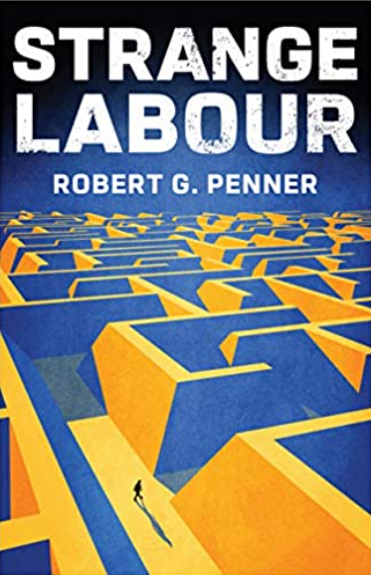|
The Breadcrumbs widget will appear here on the published site.
By Alex Carrigan T.S. Eliot once opined "This is the way the world ends / Not with a bang but a whimper" in his poem "The Hollow Men." Normally, in fiction about the end of the world, it usually ends in fire, nuclear blasts, disease, famine, or something else that makes it quite a bang and not a whimper. Of course, Eliot's quote can refer more to the death of the world as more quiet in a grand cosmic scale, but what if society were to collapse in such a slow, quiet way? What could that look like? In Canadian speculative author Robert G. Penner's newest novel Strange Labour, we see the collapse of civilization in a series of whimpers backed up by the sound of shovels digging up the earth. In the story, we follow Miranda, a woman left all alone following the complete collapse of the world as she knew it. One day, for no explained reason, the majority of humanity simply stopped whatever they were doing, left their homes and jobs, and made their way to the wilderness to start digging into the earth, producing large and unidentifiable earthworks akin to the Nazca Lines. They are in an entranced state, their personalities completely overwritten and with only their purpose to be to continue to work until death, with their new society maintaining itself to ensure the workers are fed and rested to continue working. The people who did not fall into this compulsion are left to survive in the remains of the world. Miranda, a former New York accountant, spends the story roaming the U.S., searching for supplies and shelter, but with only loose goals to carry her forward. This picaresque story sees her meeting all kinds of people along her journey, from a woman trying to keep the remains of a retirement home safe, to a drug-using epileptic man who becomes Miranda's main companion, to a group of people who have turned a skyscraper in Toledo into a bastion of art and culture. What's fascinating about Strange Labour is the emptiness of the setting. The novel at times feels like a post-apocalyptic zombie novel without the zombies. Many of the trappings of post-apocalyptic literature aren't present. The diggers are not a threat to Miranda or any of the non-affected characters and can be used to get supplies and gas if needed. There are no roving bandit gangs that subsist on toxic masculinity and needless violence, or any real human antagonists as well. Most of the threats the characters face are from starving dogs or sudden changes in the weather. Even scavenging is seen as simple and almost always available, with no real threat of robberies or betrayal. So what does that leave in the story if there are virtually no external threats to Miranda and the other characters? Well, meditation and introspection, for the most part. The characters, although their society has collapsed, seem more content to keep society going in their small ways, whether it's maintaining old structures or forming new ones. Even then, all anyone does want is to simply keep the course going rather than give in to any petty squabbles. Miranda can leave settlements whenever she chooses without fear of retribution, not because she's crafty or resourceful enough to evade them, but because no one cares enough to pursue her. She's one less person to deal with, and no one has any motive to escalate things. Because of this, the novel is mostly about how our protagonist views the new normal and readjusts her life to fit it. Miranda never seemed like the sort of person who would eat canned food or use firearms, but to her, they are simply adjustments she has to make to stay alive, even if there isn't much of a concrete goal or solution to what has happened to the world. We focus on how she views those around her and how those she has even the most minor of interactions with can deeply affect her as she moves to the next space. She may not be holding a shovel like the majority of humanity, but this peaceful societal collapse has afforded Miranda the time to truly dig deep into herself and evaluate herself and how she wants to use the rest of her life. Strange Labour is a memorably introspective post-apocalyptic tale that presents a world that appears bleak, but offers plenty of hope in the process. By removing a lot of the typical aspects of post-apocalyptic storytelling, Penner has crafted a tale that still has the thrill and drama, but with more time spent on the everyday reality of such a world. It may not be the most exciting tale in the genre, but it's one that still has plenty to enjoy from its character study and commitment to showing the challenges and trials that one would have to undergo to last in a world like this.
0 Comments
CommentsYour comment will be posted after it is approved.
Leave a Reply. |
AuthorWrite something about yourself. No need to be fancy, just an overview. Archives
July 2024
Categories
All
|



 RSS Feed
RSS Feed






